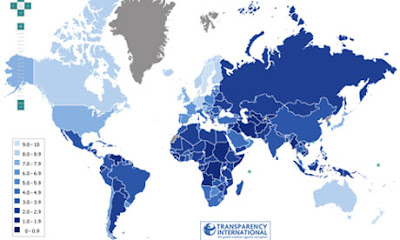
Lagos — Nigeria dropped nine places to 130th position out of the 180 countries ranked on the global Corruption Perceptions Index (CPI) 2009 by Transparency International (TI), a global anti-corruption watchdog.
The survey measures domestic public sector corruption in selected countries and is conducted by TI, which is based in Berlin, Germany. In terms of level of perceived corruption, Nigeria, which had moved up 27 places to rank 121 out of 180 countries in 2008, placed 10th out of the 16 West African countries. However, according to TI, no region of the world is immune to the perils of corruption, as the world economy begins to register a tentative recovery and some nations continue to wrestle with ongoing conflict and insecurity. The newly released Corruption Perceptions Index is different from the Global Corruption Report (GCR), which was released by last September. In the GCR report, Nigeria's banking sector was lambasted for its perceived corruption, which was described as partially responsible for the collapse of many banks in the 1990s and losses to many depositors and stakeholders.
In the CPI 2009 released yesterday, Nigeria, obtaining a score of 2.5 out of a possible 10 marks, emerged 27the out of the surveyed 47 nations in sub-Saharan Africa, and 33rd out of the 53 countries in Africa. According to the detailed Index, New Zealand edged Denmark to emerge the top perceived corruption-free nation at 9.4 and 9.3 respectively, while Somalia came last out of the 180 countries surveyed, the same position as in the 2008 CPI. However, Botswana emerged first in both sub-Saharan Africa and the continent as a whole with a global ranking of 37 and a score of 5.6, while Cape Verde was ranked the best perceived corruption-free nation in West Africa with a score of 5.1 and a global ranking of 46. Ghana came second in the region, with a score of 3.9, a global ranking of 69th, a sub-Saharan ranking of seventh position as in Africa. According to Transparency International, the CPI measures the perceived levels of public-sector corruption in a given country and is a composite index, drawing on different expert and business surveys.
The 2009 CPI scored 180 countries (the same number as the 2008 and 2007 CPI) on a scale from zero (highly corrupt) to ten (highly clean). Three African nations, namely Chad (175) with 1.6 points; Sudan (176) with 1.5 points; and Somalia (180) with 1.1 points, were ranked in the bottom 10 countries on the list. Guinea, which scored 1.8 points to rank 168 globally (up from 173 in 2008), came 42nd in sub-Saharan Africa, and last in West Africa. "At a time when massive stimulus packages, fast-track disbursements of public funds and attempts to secure peace are being implemented around the world, it is essential to identify where corruption blocks good governance and accountability, in order to break its corrosive cycle," said Huguette Labelle, Chair of TI. Bribery, cartels and other corrupt practices undermine competition and contribute to massive loss of resources for development in all countries, especially the poorest ones. Between 1990 and 2005, more than 283 private international cartels were exposed that cost consumers around the world an estimated US $300 billion in overcharges, as documented in a recent TI report.
Comments